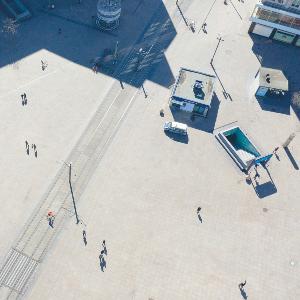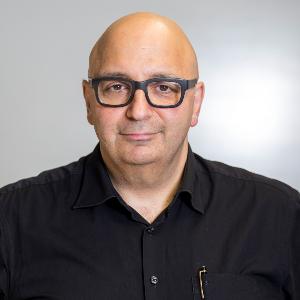Being more comfortable with uncertainty
14 Jun 2021
Political scientist Klaus H. Goetz and sociologist Armin Nassehi discuss how modern societies can deal with fundamental shocks.
14 Jun 2021
Political scientist Klaus H. Goetz and sociologist Armin Nassehi discuss how modern societies can deal with fundamental shocks.

Berlin's Alexanderplatz in Signs of Lockdown and Prescribed Crisis Mode, Spring 2020. | © Christian Ender / Getty Images
The refugee crisis, financial crisis, Brexit, climate change, Covid-19 pandemic: it seems as if “state of emergency” has long since become the normal state in our modern society. Prof. Nassehi, would a sociologist define all of these as a crisis?
Nassehi: The term actually comes from the field of medicine. In the course of a disease, crisis is the turning point—the point at which things are decided. In general, we call something a crisis when we see that routines we don’t normally have to think much about are not working. That’s when things happen that we can’t properly classify—we’re unable to clearly describe who or what is responsible for them. These things may also be very media-friendly and produce big images. With the pandemic, what’s very interesting is that the crisis is evident in the very fact that virologists suddenly have a say in what we’re doing.
Goetz: And this crisis we are in affects every member of the community. It affects all levels of politics, from the global to the local. Political, social, economic and cultural arrangements are being radically challenged. That is quite different from the crises we already face with “routine”, if you will, be it the refugee crisis or the financial crisis. And so the analytical challenges around how we approach this kind of phenomenon are also different. It’s actually not just a crisis, it’s showing at least the possibility of being an epochal shift.
So how does a political scientist define a crisis?
Goetz: It’s a questioning of arrangements that have been more or less undisputed to date: the institutional anchoring of politics, the political procedures, key content and also the foundations of trust and legitimacy. If one or more of these four aspects is fundamentally called into question, that’s when—in political science terms—we can say we’re in a crisis. It also makes an enormous difference whether we’re dealing with a creeping or gradual crisis, in other words, whether it’s a slow decay that becomes apparent at some point and turns into an acute crisis, or whether it’s a case of events that befall a community and policymakers more or less overnight.
How well prepared are modern political systems for these different forms of crisis?
Goetz: Political systems are constantly monitoring themselves. In all significant areas of politics, such as transportation, pensions or fiscal policy, we have differentiated institutions and procedures that serve the purpose of self-monitoring. This monitoring highlights undesirable developments at an early stage. There are elaborate crisis plans in place for particularly vulnerable systems, and there were such plans for the pandemic, at both international and national levels. The question is, can these plans actually be applied when the crisis happens? Do they need readjusting? In this sense, highly developed societies are constantly living in the shadow of crisis, because much of modern policy is aimed at avoiding crises.
Nassehi: I would definitely agree with that diagnosis. But what’s interesting about the pandemic crisis is that, from an operational perspective, society wasn’t in crisis at all, because the systems were working perfectly. All the functional systems, all the players in society did what they were supposed to do. In business, people were thinking about the supply chain disruptions. Politicians not only solved the factual problems, they also had to clarify loyalty issues right from the start. The scientific world also did what it was expected to do: make truthful statements.
Goetz: That’s sugar-coating it somewhat. It’s true, the vital functions have been preserved. But the patient has largely been put in an induced coma.
Nassehi: I wasn’t finished with my description. What I mean to say is that although all systems were working perfectly, this society still barely managed to deal with the situation. In the summer of 2020, our society lapsed into a counter-intuitive state. Even though all the experts knew that things were going to get tough again in the fall, they acted as if it was all over. So, my argument is that society is actually running flawlessly and incredibly efficiently, and yet we can’t get out of crisis mode. So you have to ask yourself, why is that?
This crisis we are in affects every member of the community. It affects all levels of politics, from the global to the local. Political, social, economic and cultural arrangements are being radically challenged.Prof. Klaus H. Goetz
And—why is that?
Nassehi: Well, you have to wonder whether the crisis is possibly rooted in the structure of this society. A society that is incredibly efficient within its individual functional systems, but that obviously has a deficiency when it comes to coordinating these systems, such that it is unable to act collectively in a crisis. And maybe that’s where the difference between a sociologist and a political scientist comes in: I think the political system is less capable of being the moderator between the different functions. For me, it’s just one functional system out of many, which also has its own problems to solve. But that’s the fascinating thing about this: nothing has actually collapsed, and yet we are unable to overcome the crisis.
Goetz: I would disagree with that. In my view, a great deal has collapsed. Substantial parts of the economy have effectively shut down, as have things in the education system and in cultural life. “Everything is functioning as before, and yet we have a crisis”—that is simply not true. And it hasn’t been possible to translate that into political debate either. For whatever reason, the main center parties very quickly agreed on an all-party consensus. As a result, the only opposition forces left are the Left Party, on the one side, and the AfD, on the other. And the sometimes more, sometimes less extensive ban on demonstrations meant that it was very hard for a critical public to have their voices heard. In my view, even organized politics partially shut itself down.
Nassehi: When I said “functioning”, I didn’t mean that everything was going well. Politics was sometimes unable to take place, parliaments were almost not consulted at all. The basic mechanism of the political system, namely the ability to distinguish between the government and the opposition, practically no longer existed. A huge number of structures disappeared.
How do you explain this development?
Goetz: A book that comes to mind is Protean Power, published by political scientists Peter Katzenstein and Lucia Seybert prior to Covid-19. By protean power they mean the idea of innovation and experimentation that can come into play when you’re dealing with uncertainty. Policymakers usually respond to risk with control; we saw that in the financial crisis. But when there is real uncertainty, that’s when opportunities for protean power open up, the chance for experimentation and innovation. In my view, a key problem in our response to the current crisis has been that we have reacted to a situation of uncertainty as if it were a risk that could be completely controlled.
There has been a succession of three-week lockdowns since late summer, but their goals were never clearly formulated. What this shows is that policymakers themselves were very uncertain about what the goals actually were.Prof. Armin Nassehi
What is it that makes the difference in the way we react?
Goetz: Risks can be calculated, in the same way as insurers Munich Re calculate risk just down the street from my office. With uncertainty it’s different. People often react to risks with control. In the case of a virus, that does make sense: you have to get its spread “under control”. But then this control thinking was simply extended to all other parts of society—without considering that its transferability is limited. Other ideas for how to deal with a crisis, namely actually doing experiments, were very quickly abandoned. It also seems to me that politics has gone beyond the limits of what it can control, and that this must inevitably fail because it restricts the ability of other societal systems to solve problems. There has been too much state and too little society.
Nassehi: Government policy has to strike a delicate balance. Can it really trust society or, for that matter, the institutions putting forward strategies, to self-regulate?
How much self-regulation can you expect from people within the uncertainty of a crisis?
Nassehi: There is a kind of middle-class bias. People like us from the middle class, the academic sector, we think that if we just explain to people what they should do, they will comply.
Goetz: Isn’t that the social project of the Enlightenment: that man is capable of reason?
Nassehi: Exactly, that is perhaps itself the bias: actually generating the right actions by explaining the facts. We know that self-responsibility can be achieved in situations where people are given the resources to be able to exercise it. Why, for example, can’t schools organize themselves, give themselves rules? Why can’t cultural institutions and universities do that? We have had a very exhaustive—actually a very uncreative—form of control.
In my view, a great deal has collapsed. Substantial parts of the economy have effectively shut down, as have things in the education system and in cultural life.Klaus H. Goetz
Mr. Nassehi, what conditions must be met for people to really follow rules?
Nassehi: We know from academic research that people do follow rules, even when they interfere strongly with their own lives, if two criteria are met. First, it has to look fair, no one must be being taken advantage of. And second, the criteria at stake must be transparent. Big mistakes have been made there; in the pandemic, there has been a succession of three-week lockdowns since late summer, but their goals were never clearly formulated. What this shows is that policymakers themselves were very uncertain about what the goals actually were.
Mr. Goetz, you say there hasn’t been much politics happening, in the sense of public debate, during this crisis. But thousands of YouTube videos have been shared and commented on millions of times.
Goetz: Of course, there is a tremendous preoccupation with this crisis, especially on social media. But in a liberal democracy, politics takes place in institutional forums and in procedures regulated by constitutional law and ordinary legislation. This kind of controversial discourse has come to an almost complete standstill in the coronavirus pandemic. I consider that a problem.
Mr. Nassehi, do you share this analysis?
Nassehi: I share most of the diagnoses, but I am skeptical about the motives and description of what drives people to follow rules. This is a question that has to be taken very, very seriously, even though in our political system, and with the idea of liberal thinking, we rely on the fact that people should act of their own free will. They should do what they want—but then they should also want what they should. We can never think of freedom without discipline; that’s the evil blind spot of this acting individually. And right now we are already looking somewhat into the abyss of our capability for persuasion. It’s true that people in highly organized contexts have been very good at following rules, but where the attention span was gone, it’s been infinitely more difficult. Whether one should immediately react to this by totally renouncing personal responsibility, totally renouncing experimentation, is another question. But there is a difference in our analyses. And I would be interested to know whether this difference is a result of us as people, two individuals, or whether it has something to do with the disciplines we represent.
Goetz: I don’t know. But I wasn’t putting the case for rulelessness; what I wanted to say was: Who is setting the standards? And aren’t we dealing here with an encroachment of the state’s role as standard-setter into spheres of society that are accustomed, at least in part, to setting their own rules, and often do very well with that in liberal systems? Government action has various instruments it can use. It can regulate, it can support, it can inform, it can coordinate and it can mobilize. If you think of the refugee crisis, we were very proud of the extent to which society mobilized to help solve a political problem. In this crisis, civil society has played no role. It is primarily being politically regulated but not mobilized.
One thing we’ve learned from the crisis is that crisis mode is actually not a good mode for crises.Armin Nassehi
Will that leave a lasting mark on society and the political system?
Nassehi: It’s hard to say, especially since that’s talking about the future. But seriously: I mean, as an optimist, which I actually am systematically, I would say that many unsuitable structures within society are becoming visible right now: How do we deal with conflicting goals, how does control by society work? Don’t political actors, out of their own interest, have to pay more attention to difference than to large-scale consensus? I think if there’s anything we’re learning from the crisis, it’s actually to see how fragile some of our institutional arrangements are. And as a sociologist I’ve been interested for a long time in how—in a highly differentiated society like ours—to make the very different functions of that society talk to each other. In a society that isn’t accustomed to having anything like an operational center, and in which acting collectively is difficult, how is it possible to find places where political, economic, legal, scientific questions can be put in a relationship to each other such that something else, something more effective emerges?
Goetz: From a political science perspective, one important aspect will be: How do organizations deal with turbulence? And given the European system of multi-level governance, an important question is: Do you respond with integration or do you opt for disintegration? Before the crisis hit, we’d been having an intensifying debate in the European Union about differentiation and disintegration. Brexit is one big example of this. In recent months, that has taken a back seat in the headlines. On the other hand, we now have another deepening at EU level, namely this huge “Next Generation Europe” package—worth 750 billion euros. Perhaps, in five or ten years, we’ll be asking: Was the pandemic a crisis that led to a further deepening of European integration?
So, is the crisis really an opportunity after all?
Goetz: “The crisis is an opportunity” is a much overused phrase. But when you say opportunity, an opportunity for whom? Who is empowered by a crisis? And we see that it’s primarily the part of the political system that is directly empowered to act: the executive. As a crisis response that is understandable, perhaps appropriate to some extent, but what does it say on the patient information leaflet that comes with medicines? There are risks and side effects. And we have already seen the side effects. The constant crisis mode in which the EU has found itself since the financial crisis has not boosted support for European integration in the member states, it’s one of the reasons for the rise of right-wing, and in some cases left-wing, populist parties in Europe. The alarm bells are ringing.
Nassehi: I share Klaus Goetz’s assessment. One thing we’ve learned from the crisis is that crisis mode is actually not a good mode for crises. Even at the beginning of the crisis, we heard many voices saying, oh, you could govern by executive fiat, that would be a blueprint for the climate crisis and for everything that is to come. As far as I’m concerned, that would be the dystopia of all dystopias. What I’ve seen in the crisis is actually that society has major deficits when it comes to enabling collective action, or at least integrating different conflicting goals and functions. There’s a lot still to be done there, and that includes social science research on how to deal with exceptional circumstances.
Moderation: Hubert Filser and Nikolaus Nützel

Prof. Dr. Klaus H. Goetz
holds the Chair of Political Systems and European Integration at the Geschwister Scholl Institute of Political Science at LMU. Born in 1961, Goetz studied political science at the University of Tübingen, the University of Massachusetts, USA, and the London School of Economics and Political Science (LSE), UK. He received his doctorate from Nuffield College, University of Oxford, UK. He subsequently taught and conducted research at Nuffield College, the German University of Administrative Sciences in Speyer and the Department of Government at LSE. Goetz held the Chair of Politics and Governance in Germany and Europe at the University of Potsdam before coming to the GSI in 2013. In 2019/2020, Goetz led the research group on “Exceptional Political Dynamics” at LMU’s Center for Advanced Studies (CAS).

© LMU
Prof. Dr. Armin Nassehi holds the Chair of General Sociology and Theory of Society. Born in 1960, Nassehi studied education, philosophy and sociology. He received his doctorate and habilitation in sociology from the University of Münster. He then taught at Münster and Munich before being appointed to LMU in 1998. Nassehi is editor of the cultural magazine Kursbuch. Among other things, Nassehi is a member of the Bavarian Ethics Council and a member of the Coronavirus Expert Committee of the State Government of North Rhine-Westphalia.